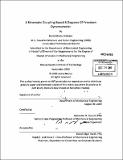A kinematic coupling based 6 degrees of freedom dynamometer
Author(s)
Moreu Gamazo, Jaime
DownloadFull printable version (60.26Mb)
Other Contributors
Massachusetts Institute of Technology. Dept. of Mechanical Engineering.
Advisor
Alexander H. Slocum.
Terms of use
Metadata
Show full item recordAbstract
A new 6-degree of freedom dynamometer is presented. Six load cells measure the normal forces at the contact points of a three groove kinematic coupling. Three toggle clamps are used to preload the machine, so that it does not come apart. The device was designed, analyzed, built and tested. The error will mainly depend on frictional forces, load cells error and the toggle clamps. Frictional forces affect hysteresis, absorption and settlement of the coupling. Different solutions have been designed and tested to reduce friction. First, we tried direct contact between three stainless-steel rods and the stainless-steel load cells. The results were fully distorted due to the high friction of hard steel. We also tried three stainless-steels rods with flexures to contact the steel button cells. The results were much better and more repeatable, but absorption was not good enough. Finally, we tried using Teflon. Teflon is stuck to a steel plate that touches the contact points, leaving Teflon free of high stresses and allowing it to reduce friction between the contacts. The outcome was acceptable. In this case, hysteresis will be reasonably low, absorption is moderate and settlement-based problems are small for small preloads. Fortunately, settlement ability will be improved thanks to vibrations. Future investigations shall look towards low friction solutions, since the sturdiest and most user-friendly design will be the one that minimizes friction during the settlement process.
Description
Thesis (S.M.)--Massachusetts Institute of Technology, Dept. of Mechanical Engineering, 2009. Cataloged from PDF version of thesis. Includes bibliographical references (p. 130-131).
Date issued
2009Department
Massachusetts Institute of Technology. Department of Mechanical EngineeringPublisher
Massachusetts Institute of Technology
Keywords
Mechanical Engineering.